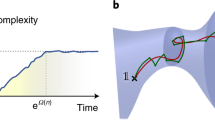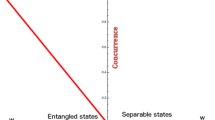Abstract
This paper considers the realizability of quantum gates from the perspective of information complexity. Since the gate is a physical device that must be controlled classically, it is subject to random error. We define the complexity of gate operation in terms of the difference between the entropy of the variables associated with initial and final states of the computation. We argue that the gate operations are irreversible if there is a difference in the accuracy associated with input and output variables. It is shown that under some conditions the gate operation may be associated with unbounded entropy, implying impossibility of implementation.
Similar content being viewed by others
References
Bennett, C. H. (1982). The thermodynamics of computation—a review. International Journal of Theoretical Physics 21, 905–940.
DiVincenzo, D. P. (1995). Two-bit gates are universal for quantum computation. Physical Review A: Mathematical and General 51, 1015–1022.
Kak, S. (1998). Quantum information in a distributed apparatus. Foundations of Physics 28, 1005; Physics Archive: quant-ph/9804047
Kak, S. (1999). The initialization problem in quantum computing. Foundations of Physics 29, 267–279; quant-ph/9805002.
Kak, S. (2000). Rotating a qubit. Information Sciences 128, 149–154; quant-ph/9910107.
Kak, S. (2001a). Statistical constraints on state preparation for a quantum computer. Pramana 57, 683–688; quant-ph/0010109.
Kak, S. (2001b). Are quantum computing models realistic? Physics Arxiv: quant-ph/0110040.
Kak, S. (2003a). General qubit errors cannot be corrected. Information Sciences 152, 195–202; quant-ph/0206144.
Kak, S. (2003b). Teleportation protocols requiring only one classical bit. Physics Arxiv: quant-ph/0305085.
Knill, E. (2004a). Fault tolerant post-selected quantum computation. Physics Arxiv: quant-ph/0404104.
Knill, E. (2004b). Quantum computing with very noisy devices. Physics Arxiv: quant-ph/0410199.
Knill, E. and Laflamme, R. (1997). A theory of quantum error-correcting codes. Physical Review A: Mathematical and General 55, 900–906.
Kitaev, A. Y. (1997). Quantum computations: algorithms and error correction. Russian Mathematical Surveys 52, 1191–1249.
Landauer, R. (1961). Irreversibility and heat generation in the computing process. IBM Journal of Research and Development 5, 183.
Nielsen, M. A. and Chuang, I. L. (2000). Quantum Computation and Quantum Information. Cambridge University Press.
Steane, A. M. (1999). Efficient fault-tolerant quantum computing. Nature 399, 124–126.
Svore, K., Terhal, B. M., and DiVincenzo, D. P. (2004). Local fault-tolerant quantum computation. Physics Arxiv: quant-ph/0410047.
Author information
Authors and Affiliations
Corresponding author
Additional information
PACS number: 03.65
Rights and permissions
About this article
Cite this article
Kak, S. Information Complexity of Quantum Gates. Int J Theor Phys 45, 933–941 (2006). https://doi.org/10.1007/s10773-006-9086-3
Received:
Accepted:
Published:
Issue Date:
DOI: https://doi.org/10.1007/s10773-006-9086-3




